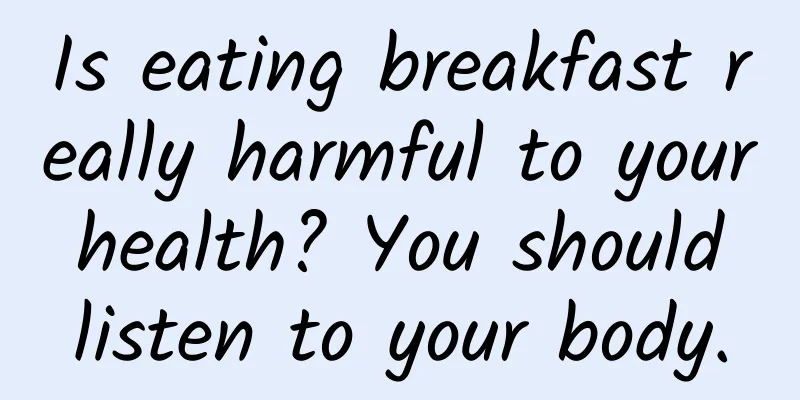Is eating breakfast really harmful to your health? You should listen to your body.

|
There is an old saying: "A day's plan begins in the morning", so eating breakfast seems to have become a natural law of life in many people's minds. However, recent news points out: "Breakfast is a dangerous meal, it is best not to eat it!" It completely subverts people's existing concept of health preservation. The traditional "must-have breakfast" that has always been regarded as the guest of honor has now become a rat crossing the street that everyone wants to kill. Is it the trend of "skipping breakfast", the White Coney Revolution that is about to set off a huge wave, or is it just Jim Jones who has changed his mind? Today, we will use the evidence from human medicine to chisel stones, split jade, uproot trees and search for roots to find the truth. In 2014, the American Journal of Clinical Nutrition published a comprehensive study on whether to eat breakfast. The answer was "inconclusive" because the results of eating breakfast varied too much to reach a consistent conclusion. For example, how do you define breakfast? The first meal after waking up, or do you have to get up early and eat the defined "breakfast" meal? What is the goal of the breakfast discussion? Is it concentration? Is it physical fitness? Is it body fat? Is it weight? These variables are issues that need further consideration. But the problem is not that simple. According to "Breakfast is a Dangerous Meal" by Terence Kealey, "Breakfast is dangerous because we eat it shortly after getting up, which is when the secretion of the hormone cortisol peaks. Cortisol wakes us up, but for unknown reasons, it makes the body resistant to insulin. Therefore, the level of insulin in the blood rises much more after breakfast than after lunch and dinner." It is good to think about the physiological mechanism of the human body from a biochemical perspective, but the physiological mechanism is complex and requires empirical evidence to test the actual numerical performance. Take me as an example. The commuting time from getting up to the company every day is nearly two hours. If I don’t eat something before going to work, I will definitely become weak and exhausted halfway through doing things, and my temper will erupt like a volcano. As the saying goes, "I would rather my friends die than me." The only ones who suffer are my colleagues around me, who can only flee in panic with nowhere to hide, but I can still nag everywhere to burn calories. But, it seems that, is it really "better" to skip breakfast? "Should I eat breakfast?" Before answering this black-and-white question, you can actually think more deeply about: "What is the purpose of eating breakfast?" Is it to become smarter? Or is it to make you feel happier and more cheerful? If review studies cannot answer your doubts about breakfast, then we can take the empirical evidence down a level and see what clinical research says. We first explored this issue from a small randomized crossover trial involving 22 obese people. The study design restricted the subjects to have a rich breakfast with the same total calorie and food intake. It was found that eating breakfast can stabilize postprandial blood sugar fluctuations better than eating dinner, with the improvement being as high as 20%. In addition, hormones in the body were also adjusted, such as insulin, C-peptide and GLP-1, which can produce more hormones to control blood sugar. Why does simply adjusting the time of intake without changing the total calorie intake, and only changing the food content of breakfast or dinner, lead to such different results? Animal experiments have found that under calorie restriction, different meal times will affect "gene transmission". Unfortunately, this theory is still in the in vitro experimental stage, so I will not go into detail about the detailed mechanism discussion! Returning to clinical experiments, taking diabetic patients as an example, eating a rich breakfast (including rich protein, appropriate amount of carbohydrates and fats) and reducing dinner intake can indeed help control long-term blood sugar (HbA1c; glycosylated hemoglobin), increase insulin sensitivity, and thus achieve the effect of controlling weight. Randomized experiments have also found that compared to not eating breakfast, having a delicious and hearty breakfast can achieve the effect of slightly controlling blood pressure. In addition, observational studies have also found that if diabetics skip breakfast, it will cause adverse effects such as increased blood pressure and promote lipid synthesis reactions in the body. If a person is a healthy adult working hard among the masses, will skipping breakfast also cause changes in his body curves? This breakfast article published in the American Journal of Clinical Nutrition may provide some clues to this. The experimental method is very simple. It is to find more than 300 people, and then randomly assign them to eat breakfast and not eat breakfast. After 16 weeks, all of them were weighed again. The results showed that there was no significant difference in weight change between eating breakfast or not. Unless people who usually eat breakfast are forced not to eat breakfast, they will lose a little weight. To explain it in plain words, whether or not you eat breakfast on weekdays has nothing to do with whether you will lose weight. Stop blaming the fat on your body on breakfast. Breakfast says it is innocent. As for a fitness physician expert, he once wrote a shocking conclusion on his blog: "The 'sacred and inviolable status' of breakfast should be questioned." Although we are all related to the medical industry, and the author also respects the noble profession of doctors, before stating such a decisive conclusion, we need to think about the sample size of the study, including only 34 subjects. The original study only shortened the meal time, and the word "breakfast" was not mentioned in the article from beginning to end. Although the results can indeed slightly reduce body fat, it is too foolish for the expert to make up the conclusion that breakfast is not eaten. So what about the concentration of children that parents are worried about? Parents are always worried that their children will not eat breakfast, which will reduce their concentration in study and lead to worse grades. Parents can only feel sad and depressed. There was a study on whether or not teenagers eat breakfast. The subjects were taken to scan brain MRI to see the physiological changes that breakfast caused in the brain. The experimental results found that children who ate breakfast scored higher in concentration tests, but there was no significant difference in reaction ability. Brain MRI found that children who ate breakfast had a significant reaction in Brodmann's frontal motor area 6, which increased their planning and movement abilities. However, in Brodmann's frontal motor area 45, a brain area responsible for writing and spelling, eating or not eating breakfast did not have a significant difference. Please allow me to digress here. Taking Taiwan Hospital as an example, a brain MRI scan costs at least NT$12,000. The number of subjects in this study is as high as 22, so the cost of conducting this human experiment is at least NT$264,000. It is not an exaggeration to say that this study is "costly". There is currently no clear conclusion on the controversy over whether or not to eat breakfast. Most of the studies are focused on patients with obesity and blood sugar control, and the number of subjects in interventional studies is also small. If you are not a professional fitness enthusiast, but just an ordinary person who is very hungry in the morning, or have blood sugar control, or mental work and other considerations, eating a hearty breakfast and controlling dinner and total daily calorie intake would be a better choice for you. This article comes from: Nutrition 123 ※For more information, please see "Nutrition 123 <Healthy and Simple>" |
>>: High-fiber salad for weight loss: Say Bye Bye to fat with these 3 tips!
Recommend
Ultrasonic diagnosis of threatened abortion
Some small stretching movements or emotional inst...
Will pelvic inflammatory disease cause gastrointestinal reactions?
Pelvic inflammatory disease is a very harmful dis...
Can I still get pregnant if I have uterine effusion?
Uterine effusion affects health. It often causes ...
Will cervical warts affect life expectancy?
Cervical warts are a very harmful disease, especi...
What are the precautions for vulvar leukoplakia
Women are more attractive because of their indepe...
What are the situations in which you should go to the Department of Reproductive Immunology? There are these 6 situations
There are six main situations that require consul...
Does endometriosis affect life expectancy?
Nowadays, endometriosis has become one of the mos...
Cucumber and egg weight loss method! Healthy weight loss and beauty
Cucumbers and eggs are both good products for wei...
What are the symptoms of adenomyosis?
What are the clinical symptoms of adenomyosis? Ma...
What are the dietary taboos for women with cervical erosion? Three aspects that patients with cervical erosion must know
What are the dietary taboos for cervical erosion?...
What causes pelvic inflammatory disease? The causes are completely different
The incidence of pelvic inflammatory disease is r...
Don't eat fat roast pork, choose low-calorie Matsusaka pork
The Mid-Autumn Festival, when the whole family ga...
What is chronic cervicitis in women? 3 professional methods to treat chronic cervicitis
Chronic cervicitis is the most common gynecologic...
What are the hazards of ovarian cysts to pregnant women?
What harm does ovarian cyst do to pregnant women?...
What are the hazards of gynecological cervicitis? Women must know the three major hazards of cervicitis
In life, we have to avoid the harm of some common...









